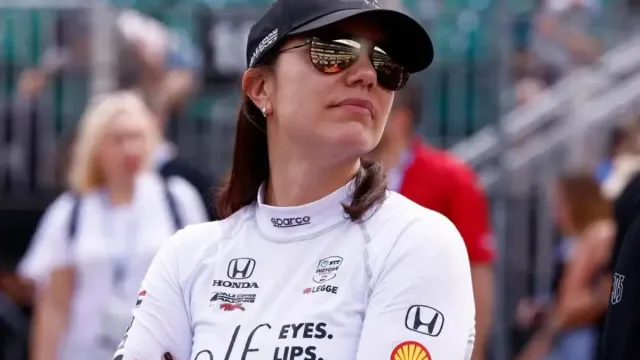Katherine Legge returned to the NASCAR track with strong lap times and high hopes. But what happened next raised big questions about how spots in races are decided.
A crash at Rockingham Speedway ended her race, but the problems started even earlier.
Despite her speed, she was nearly left out. Some say the system is unfair to drivers without big financial support. This event may show a deeper issue that could change how NASCAR is viewed.
Key Highlights
- Katherine Legge’s failure to qualify highlights NASCAR’s reliance on owner points rather than lap performance.
- Financial backing often overshadows racing talent in NASCAR’s driver selection process.
- The prevalence of pay drivers compromises the sport’s meritocracy and competitive integrity.
- Smaller teams depend on financially backed drivers, limiting opportunities for talented racers without sponsorship.
- NASCAR’s current system diminishes fan enjoyment by prioritizing predictable outcomes over genuine competition.
Katherine Legge’s Missed Opportunity and Crash
Returning to the NASCAR circuit at Rockingham Speedway, Katherine Legge faced a setback when she failed to qualify directly for the North Carolina Education Lottery 250. Her performance on the track was commendable, yet the allocation of owner points Provisionals barred her entry based on merit.
Despite the setback, Legge exhibited resilience by negotiating with J.J. Yeley to secure a spot, albeit at the rear of the lineup.
However, her opportunity was short-lived. On Lap 52, a collision with William Sawalich, who was attempting to lap her, resulted in a spin that involved Kasey Kahne. The incident prematurely ended her race, relegating her to a last-place finish after completing only 50 of the 256 laps.
This sequence of events highlights the challenges faced by drivers like Legge, who navigate a fiercely competitive environment where opportunities can be fleeting and outcomes, unforgiving.

Katherine Legge’s Frustration with the System
Katherine Legge’s disappointment with the NASCAR system resonated beyond the immediate aftermath of her crash. Her statement highlighted a broader discontent with the mechanisms that dictate race participation, specifically how owner points overshadow raw talent.
“We were able to run a fast enough lap time to put me comfortably in the race if not for owner points… That’s why my sponsors and partners were on board.” – Katherine Legge
Legge’s frustration revealed a system seemingly skewed in favor of financial backing over racing skill. Her performance, she argued, should have been sufficient for qualification based on lap times alone, illustrating an inherent imbalance within the sport’s structure.
Her ordeal emphasizes a critical reflection on whether NASCAR’s current framework adequately values driver potential.
Pay Driver Culture and Talent Overlooked
Legge’s experiences highlight a broader issue deeply ingrained in NASCAR: the prevalence of pay driver culture. This phenomenon has shifted the paradigm from rewarding sheer talent to prioritizing financial backing.
While the pay driver concept isn’t novel, its dominance in modern NASCAR emphasizes a troubling trend. In an era where financial sponsorship often trumps skill, drivers like Riley Herbst, despite modest achievements, secure coveted seats due to lucrative backing, such as from Monster Energy.
His three wins in 176 Xfinity races pale compared to Corey Heim’s impressive Truck Series record. Yet, Herbst’s financial muscle grants him opportunities like a 23XI Racing seat, while Heim remains in a lower tier.
This environment, where monetary clout eclipses raw talent, raises questions about meritocracy’s place in NASCAR, suggesting a system where financial capability often overrides proven racing skill, marginalizing deserving talents.

Impact on Teams, Fans, and Sport Quality
While financial considerations have always played a role in racing, the current state in NASCAR is causing concern for teams, fans, and the sport’s general quality. Teams are disincentivized from nurturing talent, prioritizing financial backing over skills. This trend is evident in Joey Logano’s experience, where he must bring funds to lower divisions despite being a 3 time NASCAR Cup champion. The result is a diluted competitive field, leading to races dominated by a few skilled drivers while others struggle.
“I get paid to drive a Cup car… but I have to pay to drive Xfinity or Trucks.” – Joey Logano
Fans witness races filled with inexperienced drivers causing wrecks—a scenario highlighted by Denny Hamlin’s comment on the Xfinity series majorly consisting of pay drivers. Such conditions diminish the sport’s quality, leaving enthusiasts yearning for a more competitive and talent-driven environment.
Sustainability, F1 Comparison, and the Way Forward
How can NASCAR navigate the challenges of sustainability while maintaining competitive integrity? A vital step involves addressing the financial imbalances that prioritize wealth over talent.
As Formula 1’s struggles with pay drivers like Lance Stroll demonstrate, NASCAR faces similar challenges, risking its reputation and fan base. The erosion of consistent sponsorships, as seen with Kyle Busch and Denny Hamlin, exposes a fragile economic model where short-term deals prevail, and smaller teams are compelled to rely on pay drivers.
To guarantee a sustainable future, NASCAR must foster pathways for skilled drivers to succeed regardless of financial backing. This could involve incentivizing long-term sponsorships that emphasize talent and performance.

News in Brief: Katherine Legge NASCAR Controversy
Katherine Legge’s crash highlights systemic flaws in NASCAR, where financial backing often eclipses pure talent. This pay driver culture not only sidelines skilled racers like Legge but also affects team dynamics, fan engagement, and the general quality of the sport. Drawing parallels with Formula 1, it becomes evident that fostering a more talent-centric approach is essential for NASCAR’s sustainability. Addressing these issues could pave the way for a more equitable and competitive racing landscape.
ALSO READ: Katherine Legge’s NASCAR Return Sparks Heated Debate After Collision with Kasey Kahne
